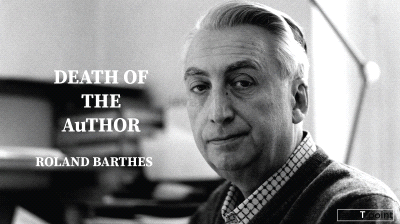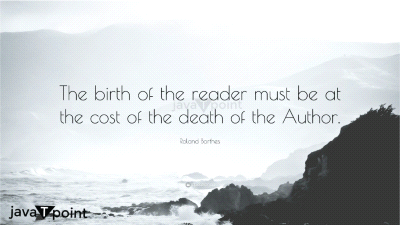The Death of Author by Roland BarthesIntroduction"The Death of the Author" is a 1967 essay by Roland Barthes, a French literary critic and theorist. It is a highly influential and controversial article (in terms of the different assertions it makes) that contributes to and changes the area of criticism in literature. Barthes criticizes and elevates the traditional approach to the evaluation of the text, which is overly author-centric: that is, centered on looking for the author's intentions and considering the author's life and background to determine the meaning of the text rather than just assessing the subject matter of the text independently. The essay criticizes recognized trends "in ordinary society oppressively focussed on the author, his identity, and his existence," and contrasts them with traditional literary analysis, which evaluates the author's psychological and individual context. 
Description of Roland BarthesRoland Barthes was a French literary critic, social theorist, and philosopher who died on March 25, 1980. Barthes' work was influential in the formation of schools of thought such as the view of structuralism, semiology, the theory of existence, Marxism, and post-structuralism. Radical equality ran through Barthes' works like a thread. During his previous Marxist time, Barthes criticized what he saw as a bourgeois cultural fallacy, the capitalist use of signals to create the illusion of a solid, permanent interpretation. In the transitional Death of the Author, he begins to abandon Marxism's illusions, abandoning the concept of the author as a constant source of meaning and thereby evaluating all meaning. In the Recreation of the Text, Barthes abandons the pursuit of meaning entirely in favor of the pursuit of delight. Although not explicitly stated, the foundation of Barthes' ideas seems to be firm atheism. The "Death of the Author" is a metaphor for the death of God, the author of all permanent and definite meanings. The Whole SynopsysIn the first line, Barthes attempts to convey the central concept of his essay through the figure of Zambinella from Balzac's novella 'Sarrasine'. Balzac writes about this figure, who is really a castrato (a castrated male) dressed as a woman, "It was Woman, with her sudden fears, irrational whims, instinctive fears, unprovoked bravado, daring, and delicious delicacy of feeling." Barthes wonders if it is ever possible to know whose ideas are being expressed in these utterances. Is this the novella's main character speaking? Is it the man Balzac, with his preconceived ideas and judgments towards women, or someone else? 
What Barthes effectively teaches us as readers is that we can never be certain if what a given character expresses is the author's personal perspective, coming through the voice of that character or someone else's. The author's intentions, according to Barthes, are immaterial. The work is not a perfect development of his ideas, and in the process of giving words to his thoughts, As the writer or creator is not God, he is taking part in a process of meaning creation over which he has no influence. Thus, attempting to deduce the author's goals is a major distraction and unimportant because, even if the author continues to exist, one cannot be completely certain And, Even if the author is being completely honest about his motivations for writing, there is no certainty that he is able to convey those ideas in his work, which would not only show an implied failure but also enhance the text's appeal due to the variety of opinions it could support. Barthes questions the notions of 'novelty' and 'reality' related to the author. There are a number of problems with this approach of giving the author enormous power. This method forces us to read the text in a biographical manner. This methodology has two flaws. The first is that it wrongly implies, as described above, that one can discover the author's objectives. Second, there is a set meaning to the text that should be sought. Barthes criticizes this by arguing that the author should not be viewed as a god creator who makes the text or meaning out of nothing, but rather as a montage maker who assembles many previous thoughts and ideas in a unique and effective manner. According to Barthes, the emphasis on the author as an initial creator is relatively new, like in prior times, such as during the Greek period, the emphasis was more on narrative methods and how a text is conveyed, rather than on its original plot because most texts were based on the same mythological stories told in various formats by different authors. 
Barthes offers more definitions of "writing" (in his understanding) in the finalclause that goesbeyond what we can understand as literature and art and deal with the obscurity of "all origins." If every instance of writing in this sense casts doubt on our understanding of the author and their relationship to the text, then this must include the notion of a heavenly developer (an "Author-God") whose clear "theological" meaning is purported to be derived from a text. No work of literature can be claimed to come from a single, dependable, dictatorial message-sender; rather, readers must view each book as an instance where various voices are engaged and blended into a "tissue of quotations drawn from innumerable cultural centres." In this context, Barthes argues that the presumed author may believe that they are conveying original ideas,but writing is nothing more than a record of a script that is predefined in language, with its random but officially adopted words and grammatical standards. Any comprehension of the meaning of a text must be "infinitely deferred," because, like searching up the term in a dictionary, deciphering a piece of writing is only possible by examining other words, and those keywords can only be comprehended by referring to yet others, and so on indefinitely. The scripter can blend and mix languageelements, but theycan never completely "express themselves." Barthes then changes his focus to another significant implication of his thesis. When readers realize that a book is not the work of an "author," and that nothing they are aware of the author would disclose anything conclusive about the text's meaning, professional literary criticism in Barthes's day is exposed as an unreal. Critics strive to establish their own significance by claiming, based on their assumed understanding of the writer, that they can discover within the text the author's purpose to express some thought or feeling, an ultimate meaning they insist on laying down. The most a critic can do, according to Barthes, is sketch out the numerous voices of language interacting and colliding with each other in a book to demonstrate how "writing ceaselessly posits meaning ceaselessly to evaporate it". To acknowledge that both the author's and the critic's assessments are mirages, cultural fantasies that some divine force is at work behind the book, the word "literature" should be replaced with "writing" Once again, Barthes broadens the scope of this assertion to include all disciplines that use writing, such as law and science?fields that people frequently "worship" as substitute gods because they believe their authority is fixed, defined, and related to the objectives of a mythological creature. ConclusionThus, throughout this essay, Barthes argues that to assure the future of writing, the metamorphically death of the author is necessary, which leads to the birth of the reader. According to Barthes, writing can only be seen correctly once the author has died. "To give that text an author" he argues, "is to impose a limit on that text, to furnish it with final signified, to close the writing." As a result, it is entirely reasonable to state that Roland Barthes made significant contributions to the field of literature.
Next TopicDon Quixote by Cervantes Summary
|
 For Videos Join Our Youtube Channel: Join Now
For Videos Join Our Youtube Channel: Join Now
Feedback
- Send your Feedback to [email protected]
Help Others, Please Share









